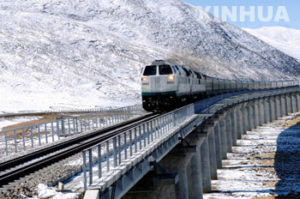
NepalForeignAffairs.com Image credit: Xinhua
By Kamal Dev Bhattarai
When Chinese Prime Minister Li Keqiang met Nepal’s Deputy Prime Minister and Foreign Minister Krishna Bahadur Mahara on September 7 in Beijing, the Chinese premier underlined China’s three priorities in Nepal, i.e. connectivity, trade and investment.
According to Xinhua news agency, the Chinese Premier also expressed his desire to cooperate in energy, infrastructure, and post-disaster reconstruction and tourism. China wants to work in these areas under Belt and Road Initiatives (BRI), a flagship Chinese project announced by President Xi Jinping. DPM Mahara requested the Chinese side invest in connectivity and infrastructure projects.
Li’s statement clearly shows China’s key concerns in the Himalayan nation which is sandwiched between two Asian powers India and China. A week after Prime Minister Sher Bahadur Deuba paid an official visit; Deputy Prime Minister Mahara held high-level meetings in Beijing. During Mahara’s visit to Beijing, two countries agreed to work together to ‘speed up the feasibility study of Free Trade Agreement (FTA) and development of cross-border economic zones.’
Interestingly, growing Chinese influence in Nepal was also one of the major issues discussed during PM Deuba’s India visit. As China continues to increase its influence in Nepal challenging India’s sole dominance in Nepal, a sense of uneasiness is clearly seen in New Delhi. Not only at the government level, there is growing concern in Delhi about growing Chinese influence in Nepal. This clearly indicates that China has emerged as a major factor in India-Nepal relation. During the meeting with Deuba, India’s former Prime Minister Manmohan Singh clearly inquired Deuba about Nepal’s relation with China and growing Chinese influence.
In the recent years, China has stepped up high-level visits to Nepal in the recent days. Chinese vice Prime Minister Wang Yang concluded three day (15-17 August) to Nepal signing three agreements related to bilateral economic and infrastructure cooperation.
Chinese leaders, government officials and military officials are visiting Nepal almost on monthly basis. In December last year Liu Qibao, a senior leader of Chinese Communist Party and head of party’s propaganda department visited Nepal and discussed on connectivity agenda. In March this year, Chinese Defense Minister and State Councilor General Wanqan paid a three-day official visit to Nepal. The Defense Minister pledged to provide assistance to Nepal Army and Nepal Police. There are other various visits from China.
The frequent visits from India and China clearly demonstrate the competition between two giant neighbors to increase their influence in Nepal. India seems worried about its decreasing influence in Nepal. China, on the other hand, is working to increase its influence in Nepal though its economic strength.
It is easier for China to increase its influence in Nepal due to at least four reasons. First, there is no opposition or even criticisms from political parties and media if Nepal government signs deal and understanding with China. Second, the border blockade in 2015 contributed to anti-Indian feeling in Nepal which provided room to substantially increase its influence in Nepal. After the blockade China made significant inroad in Nepal not only in trade, investment and security sector but also in the hearts and minds of ordinary people.
Third, opinion makers, media and intellectuals are supportive of any initiatives taken by China in Nepal. Fourth, China prefers to work closely with any government in Nepal irrespective which party or leader leads the government; it is not selective like India. India always distinguishes the parties\ media\ political leaders as favorable and unfavorable to it and deals accordingly.
There is a growing perception in Nepal that deal with India would be unfair and disadvantageous to Nepal. In the last two years, there has not been any big deal between India and Nepal. Prime Ministers who frequently visit to India refuse to sign a deal with a fear of criticisms by opposition parties.
But, there have been several deals between Nepal and China in the last two years and China is making inroad to Nepal. Two years ago, CPN-UML Chairman KP Oli-led government signed Trade and Transit agreement with China ending India’s monopoly. Chinese side is pressing Nepal to implement the agreements reached between two countries during Oli’s tenure. The erstwhile government led by CPN (Maoist Centre) Pushpa Kamal Dahal signed an accord on the framework Belt and Road Initiative (BRI). Du in May this year, Nepal government awarded 12,00 MW Budhi Gandaki Hydroelectric project to a Chinese firm.
The competition India and China is clearly evident in several areas. Connectivity is one of the major areas where two countries are closely competing in Nepal. China plans to extend its railway to Lumbini.
Military is another area where China is challenging India’s influence. Armies of Nepal and India enjoy a special relationship which has been established since the long period. India is still the largest supplier of military hardware to Nepal. Hundreds of Nepal Army officials get training and scholarship opportunities in India on annual basis.
China is extending more hardware and budgetary support to Nepal Army. Similarly, Nepal Army is keen to purchase its military requirement from China. Nepal and China began joint military drill from this year which is a remarkable shift in the military relation between two countries.
Trade and Transit is another area when two Asian giant are competing each other. For the long time, Nepal used only Kolkata port the export and import with third countries. Now, both countries are offer new transit routes.
As both countries are pressing for specific development, hydro and other connectivity projects, it has been difficult to Nepal government to make decision. Dealing with India and China is increasingly becoming a major foreign policy challenge for Nepal though they are major development partners. As India-China relation continues to sour, it will be more difficult to make a balance relation between two countries.
